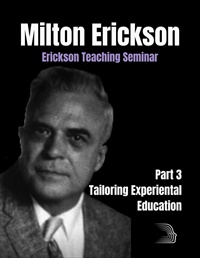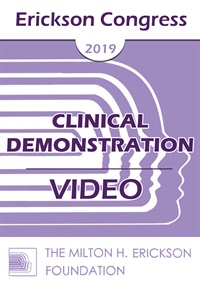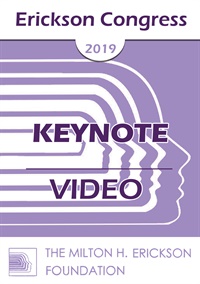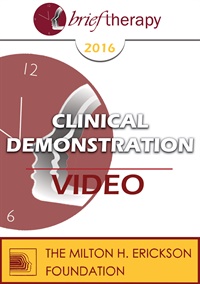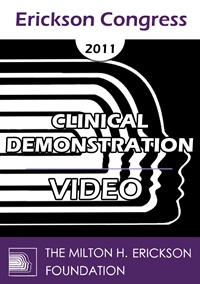- Average Rating:
- Not yet rated
- Topic Areas:
- Ericksonian Hypnosis and Therapy Techniques | Milton Erickson | Tailoring | Experiential Therapy | Unconscious Processes | Trance
- Categories:
- Erickson Materials | Erickson Streaming Video Collection | Milton H. Erickson Collections
- Faculty:
- Milton H. Erickson, MD | Jeffrey Zeig, PhD
- Course Levels:
- Master Degree or Higher in Health-Related Field
- Duration:
- 1 hour
- Format:
- Audio and Video
- Original Program Date:
- May 07, 2020
- Short Description:
- In part three of a Teaching Seminar with Milton Erickson, we continue the development of trance experience in the primary subject. You will encounter the experiential teaching method for which Erickson was renowned.
- Price:
- $29.95 - Base Price
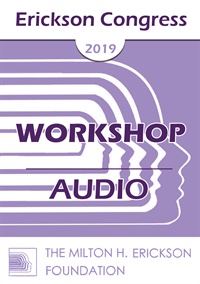
- Average Rating:
- Not yet rated
- Topic Areas:
- Workshops | Trance | Hypnotherapy | Unconscious Processes
- Categories:
- Erickson Congress | Erickson Congress 2019
- Faculty:
- Stephen Gilligan, PhD
- Duration:
- 2 Hours 1 Minutes
- Format:
- Audio Only
- Original Program Date:
- Dec 15, 2019
- Short Description:
- This workshop presents Dr. Gilligan’s latest work of Systemic Trance, which describes how we generate our realities via the (mostly unconscious) maps of who we are, and what the world is. These systemic filters can be held negatively (in neuro-muscular lock) or generatively (in creative flow), resulting in either problems or positive solutions. To transform problems into resources, Systemic Trance first identifies the key parts of a performance map, then uses generative trance to open a fluid conversational space where each part is positive valued and integrated into a resource pattern. Lecture, demonstration, case examples, and exercises will be included.
- Price:
- $15.00 - Base Price
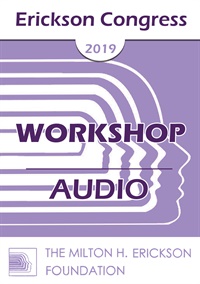
- Average Rating:
- Not yet rated
- Topic Areas:
- Workshops | Neuroscience | Unconscious Processes | Consciousness | Mindfulness | Trance
- Categories:
- Erickson Congress | Erickson Congress 2019
- Faculty:
- Richard Landis, PhD | Gary Ruelas, DO, PhD
- Duration:
- 1 Hour 58 Minutes
- Format:
- Audio Only
- Original Program Date:
- Dec 15, 2019
- Short Description:
- Whether it is a deep state of trance, a phenomenon of awe-ness, a psychedelic induced expansion, and/or a break through or breakdown of perception, therein lays a greater and “deeper” experience of change. From a neuroplastic or biological state there is the activation of the midbrain, such as the amygdale, cingulate gyrus, nucleus accumbens, which then alter the perceptions of the neocortex.
- Price:
- $15.00 - Base Price
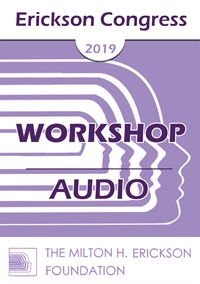
- Average Rating:
- Not yet rated
- Topic Areas:
- Workshops | Ericksonian Psychotherapy | Psychotherapy | Ericksonian Hypnosis and Therapy Techniques | Unconscious Processes
- Categories:
- Erickson Congress | Erickson Congress 2019
- Faculty:
- Teresa Robles, MA, PhD
- Duration:
- 1 Hour 30 Minutes
- Format:
- Audio Only
- Original Program Date:
- Dec 15, 2019
- Short Description:
- Dr. Erickson proposed that all our life experiences were learnings and resources registered in our Unconscious Mind. He considered Unconscious Mind as a Wise Part. For Quantum Physics in the same way that all the information about each person is in its DNA, the information of the Whole Universe is present in each one of its parts. I call that information our Universal Wisdom. Wisdom, because it is all the information and Universal because it is the same everywhere. For me Universal Wisdom is the Creative Force, and so, Almighty. That is not a question of beliefs but a question of imagining. What we imagine for our brain is stronger than what it recognizes as reality.
- Price:
- $15.00 - Base Price
- Average Rating:
- Not yet rated
- Topic Areas:
- Clinical Demonstrations | Utilization | Consciousness | Unconscious Processes | Psychotherapy
- Categories:
- Erickson Congress | Erickson Congress 2019
- Faculty:
- Gunther Schmidt, MD, MA
- Course Levels:
- Master Degree or Higher in Health-Related Field
- Duration:
- 1 Hour
- Format:
- Audio and Video
- Original Program Date:
- Dec 14, 2019
- Short Description:
- If somebody experiences a problem this can be described as self-made constructions of reality (not wanted, on an involuntary and mostly unconscious level) which expresses a discrepancy between what is experienced as "it is just happening“ and "what should be“. Suffering evolves when the conscious mind is fighting the unwanted involuntary reactions to tries to escape from them or erase them because all these attempted solutions fail.
- Price:
-
Sale is $29.00
price reduced from Base Price - $59.00
- Average Rating:
- Not yet rated
- Topic Areas:
- Keynotes | Ericksonian Hypnosis and Therapy Techniques | History of Psychotherapy | Metaphors | Utilization | Experiential Therapy | Unconscious Processes
- Categories:
- Erickson Congress | Erickson Congress 2019
- Faculty:
- Stephen Lankton, MSW
- Course Levels:
- Master Degree or Higher in Health-Related Field
- Duration:
- 54 Minutes
- Format:
- Audio and Video
- Original Program Date:
- Dec 12, 2019
- Short Description:
- Dr. Milton Erickson graduated from the University of Wisconsin’s School of Medicine in 1925. During the ensuing 55 years of his career, Erickson was devoted to researching, practicing, learning, refining, teaching, and publishing the lessons borne of his creative intuition and experience. And over the years his practices evolved. The last two decades of his life, and even more so in the 40 years since his death, through the efforts of those he influenced the number of ideas and interventions attributed to Erickson proliferated abundantly.
- Price:
-
Sale is $29.00
price reduced from Base Price - $59.00
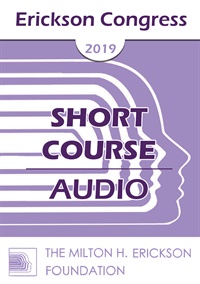
- Average Rating:
- Not yet rated
- Topic Areas:
- Short Courses | Hypnosis | Unconscious Processes | Dissociation | Psychology
- Categories:
- Erickson Congress | Erickson Congress 2019
- Faculty:
- Jesus Menendez Reyes
- Duration:
- 1 Hour 21 Minutes
- Format:
- Audio Only
- Original Program Date:
- Dec 12, 2019
- Short Description:
- This presentation will review the concept of dissociation and its evolution in modern Psychology and its relationship with hypnotic process, when it is described as a mind state of focused attention. We will explore the idea of dissociation between the conscious and unconscious mind during hypnosis and how it can lead to therapeutic success. Some practical exercises and demonstrations to provoke dissociate states.
- Price:
- $15.00 - Base Price
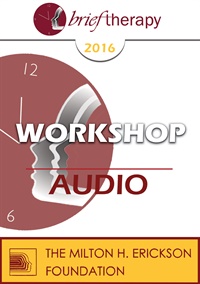
- Average Rating:
- Not yet rated
- Topic Areas:
- Workshops | Metaphors | Unconscious Processes | Brief Therapy
- Categories:
- Brief Therapy Conference | Brief Therapy Conference 2016
- Faculty:
- Connirae Andreas, PhD
- Duration:
- 2:24:50
- Format:
- Audio Only
- Original Program Date:
- Dec 11, 2016
- Short Description:
- Explore a new way to discover and work with our unconscious metaphors for our life issues, developed by Andrew T. Austin of the UK. Do you feel “stuck”? Is something “holding you back”? Is it difficult to know what direction to go? Instead of creating metaphors for our clients, we can elicit the metaphor they already have, and explore it in depth. Once this inner landscape is revealed, new directions and possibilities often become blatantly obvious. This introduction will include brief demonstration(s) and group explorations.
- Price:
- $15.00 - Base Price
- Average Rating:
- Not yet rated
- Topic Areas:
- Psychotherapy | Clinical Demonstrations | Generative Psychotherapy | Unconscious Processes
- Categories:
- Brief Therapy Conference | Brief Therapy Conference 2016
- Faculty:
- Stephen Gilligan, PhD
- Course Levels:
- Master Degree or Higher in Health-Related Field
- Duration:
- 58:40
- Format:
- Audio and Video
- Original Program Date:
- Dec 10, 2016
- Short Description:
- Problems/Symptoms may be viewed as attempts by the creative unconscious to bring transformation and healing. A generative state can allow that transformation to be realized.
- Price:
-
Sale is $29.00
price reduced from Base Price - $59.00
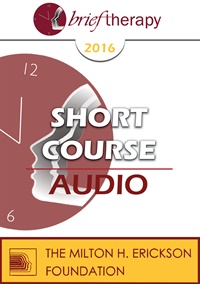
- Average Rating:
- Not yet rated
- Topic Areas:
- Short Courses | Unconscious Processes | Resistance | Couples Therapy | Ericksonian Hypnosis and Therapy Techniques | Utilization
- Categories:
- Brief Therapy Conference | Brief Therapy Conference 2016
- Faculty:
- Bruce Gregory, PhD | Birgitta Gregory, PhD
- Duration:
- 1:25:18
- Format:
- Audio Only
- Original Program Date:
- Dec 08, 2016
- Short Description:
- This workshop will address how the principles and variables of quantum physics can be integrated in the transformation of resistance in individuals and couples. The Erickson Resistance Protocol will be utilized as a metaphor and template to support the expansion of trust and creativity within the professional in the transformation of resistance.
- Price:
- $15.00 - Base Price
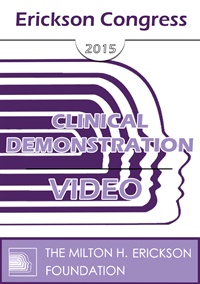
- Average Rating:
- Not yet rated
- Topic Areas:
- Clinical Demonstrations | Unconscious Processes | Utilization | Ericksonian Hypnosis and Therapy Techniques | Trance
- Categories:
- Erickson Congress | Erickson Congress 2015
- Faculty:
- Eric Greenleaf, PhD
- Course Levels:
- Master Degree or Higher in Health-Related Field
- Duration:
- 01:08:00
- Format:
- Audio and Video
- Original Program Date:
- Dec 12, 2015
- Short Description:
- The unconscious mind concept and its' processes are briefly described. Trance is induced by the patient's visual description of his/her unconscious. The problem is visualized, as in a dream. Trance is deepened by placing the image of the problem into the unconscious "to see what happens."
- Price:
-
Sale is $29.00
price reduced from Base Price - $59.00
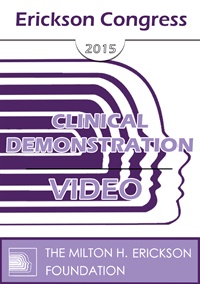
- Average Rating:
- Not yet rated
- Topic Areas:
- Clinical Demonstrations | Unconscious Processes | Communication
- Categories:
- Erickson Congress | Erickson Congress 2015
- Faculty:
- Steve Andreas, MA, NLP
- Course Levels:
- Master Degree or Higher in Health-Related Field
- Duration:
- 01:06:00
- Format:
- Audio and Video
- Original Program Date:
- Dec 11, 2015
- Short Description:
- We all talk to ourselves internally, sometimes resourcefully, sometimes critically, sometimes with our own voice, sometimes with the voices of others. Changing the unconscious nonverbal process elements of a voice is usually much more effective and emotionally impactful than changing the words.
- Price:
-
Sale is $29.00
price reduced from Base Price - $59.00
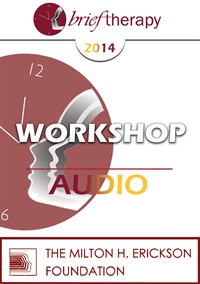
- Average Rating:
- Not yet rated
- Topic Areas:
- Anxiety | Workshops | Unconscious Processes | Brief Therapy
- Categories:
- Brief Therapy Conference | Brief Therapy Conference 2014
- Faculty:
- Steve Andreas, MA, NLP
- Duration:
- 1:05:06
- Format:
- Audio Only
- Original Program Date:
- Dec 12, 2014
- Short Description:
- Learn two very simple, rapid, and direct ways to elicit and transform the key unconscious processes that create anxiety. One utilizes changes in the sensory details of the feeling itself; the other changes the tempo of the internal worry voice that generates the feeling. Demonstrations, exercises and discussion.
- Price:
- $15.00 - Base Price
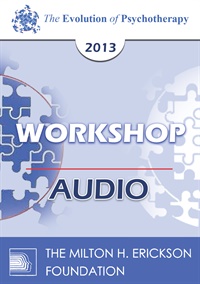
- Average Rating:
- Not yet rated
- Topic Areas:
- Workshops | Unconscious Processes | Art and Creativity | Consciousness | Four-Stage Creative Process | Psychotherapy
- Categories:
- Evolution of Psychotherapy | Evolution of Psychotherapy 2013
- Faculty:
- Ernest Rossi, PhD | Kathryn Rossi, PhD | Bruce Gregory, PhD | Birgitta Gregory, PhD
- Duration:
- 2 Hours 32 Minutes
- Format:
- Audio Only
- Original Program Date:
- Dec 11, 2013
- Short Description:
- What is Life? What is Consciousness? Theory, research and practice of Psychosocial Genomics are outlined as the next step in the Evolution of Psychotherapy. A live group demonstration of how to facilitate gene expression and brain plasticity by optimizing the 4-stage creative process for 20 minutes will be experienced by everyone.
- Price:
- $15.00 - Base Price
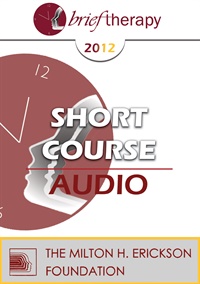
- Average Rating:
- Not yet rated
- Topic Areas:
- Short Courses | Brief Therapy | Subliminal Therapy | Unconscious Processes
- Categories:
- Brief Therapy Conference | Brief Therapy Conference 2012
- Faculty:
- Edwin Yager, PhD
- Duration:
- 1:23:45
- Format:
- Audio Only
- Original Program Date:
- Dec 09, 2012
- Short Description:
- Subliminal Therapy is an innovative and easily-learned, psychodynamic technique for use in clinical settings. The theory, rationale and application are presented in this workshop, including compelling data on efficacy as derived from patient-completed, pre- and post-treatment inventories. The workshop addresses application of ST to both psychological and psychogenic medical problems.
- Price:
- $15.00 - Base Price
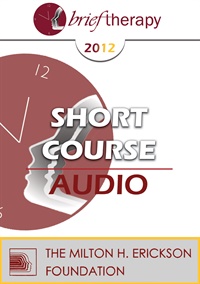
- Average Rating:
- Not yet rated
- Topic Areas:
- Short Courses
- Categories:
- Brief Therapy Conference | Brief Therapy Conference 2012
- Faculty:
- Joseph Dowling, MS, LPC
- Duration:
- 55:17
- Format:
- Audio Only
- Original Program Date:
- Dec 09, 2012
- Short Description:
- BT12 Short Course 43 – How to Become Smart Enough to Know When to Stop Thinking: A Brief Ericksonian Approach to Lasting Solutions – Joseph Dowling MS, LPC Milton H. Erickson, MD, understood that “the conscious (thinking) mind doesn’t do much of anything of much significance…while the unconscious mind is an infinite storehouse of dreams, potentials, and solutions…” This workshop will teach a brief, solution-focused, strategic, and hypnotic approach to anxiety-related disorders. Intellectualizing, analyzing, self-criticizing, WHY-ing and WHAT-IF-ing clients will be targeted as participants learn to employ Ericksonian interventions including solution-focused questions, strategic task assignments, and formal/ conversational hypnosis via live demonstration, experiential exercise, and case studies.
- Price:
- $15.00 - Base Price
Tags: Unconscious Processes
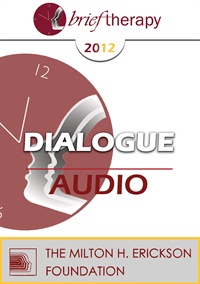
- Average Rating:
- Not yet rated
- Topic Areas:
- Dialogues | Unconscious Processes
- Categories:
- Brief Therapy Conference | Brief Therapy Conference 2012
- Faculty:
- Robert Dilts, BA | Ernest Rossi, PhD
- Duration:
- 59:05
- Format:
- Audio Only
- Original Program Date:
- Dec 07, 2012
- Short Description:
- BT12 Dialogue 04 - The Creative Unconscious in Intuition and Healing - Robert Dilts, Ernest Rossi, PhD Educational Objectives: Given a topic, describe the differing approaches to psychotherapy, and identify the strengths and weaknesses of each approach.
- Price:
- $15.00 - Base Price
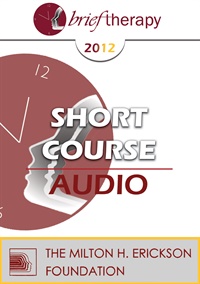
- Average Rating:
- Not yet rated
- Topic Areas:
- Worry | Short Courses | Unconscious Processes
- Categories:
- Brief Therapy Conference | Brief Therapy Conference 2012
- Faculty:
- Neil Fiore, PhD
- Duration:
- 1:40:33
- Format:
- Audio Only
- Original Program Date:
- Dec 05, 2012
- Short Description:
- BT12 Short Course 26 – From Worry to Wonder: Evoke Your Unconscious to Make the Impossible Possible – Neil Fiore, PhD Learning to shift from worry to wonder releases conscious struggle and makes more energy available for rapid recovery and healing. Reframing worry as a request from the unconscious mind for a plan to survive an anticipated crisis can reduce stress hormones and muscle tension while enhancing immune system health. Knowing you can access a deep unconscious wisdom and support frees the conscious mind and prepares it to receive a therapeutic surprise.
- Price:
- $15.00 - Base Price
Tags: Worry Unconscious Processes
- Average Rating:
- Not yet rated
- Topic Areas:
- Clinical Demonstrations | Metaphors | Unconscious Processes
- Categories:
- Erickson Congress | Erickson Congress 2011
- Faculty:
- Steve Andreas, MA, NLP
- Course Levels:
- Master Degree or Higher in Health-Related Field
- Duration:
- 58:57
- Format:
- Audio and Video
- Original Program Date:
- Dec 10, 2011
- Short Description:
- Metaphor primarily activates the client’s sub-dominant hemisphere, and this can be utilized without knowing the content of the problem. Asking a client to discover more about their metaphor for a problem is a way to communicate directly with their unconscious understandings, which are often the keys to making useful changes.
- Price:
-
Sale is $29.00
price reduced from Base Price - $59.00
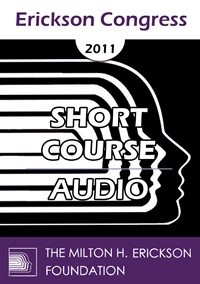
- Average Rating:
- Not yet rated
- Topic Areas:
- Ericksonian Psychotherapy | Psychotherapy | Short Courses | Ericksonian Hypnosis and Therapy Techniques | Art and Creativity | Unconscious Processes
- Categories:
- Erickson Congress | Erickson Congress 2011
- Faculty:
- Daniel Bass
- Duration:
- 56:11
- Format:
- Audio Only
- Original Program Date:
- Dec 09, 2011
- Short Description:
- Movies are complex multi-sensory stories reflecting a specific world, transporting messages and solutions in order to provide the viewer with the possibility of identifying with the movie characters. Viewers get absorbed in movies and empathize, recognize consciously or subconsciously one’s own central topics in life. They provide the possibility of being catalysts for developmental processes that can be used in psycho-therapy. In this presentation participants will learn about the processes of watching movies and the trans-fer into therapy.
- Price:
- $15.00 - Base Price
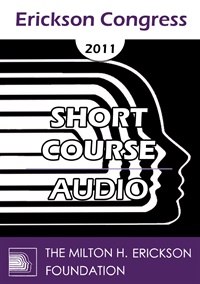
- Average Rating:
- Not yet rated
- Topic Areas:
- Short Courses | Unconscious Processes | Eating Disorders | Communication | Anorexia | Bulimia
- Categories:
- Erickson Congress | Erickson Congress 2011
- Faculty:
- Bart Walsh, MSW
- Duration:
- 1:28:11
- Format:
- Audio Only
- Original Program Date:
- Dec 09, 2011
- Short Description:
- Rapid remission of anorexia, bulimia and binge eating disorder results from this new approach. A form of unconscious communication known as ideomotor questioning is employed. Experiential exercises introduce participants to this communication style which allows safe access to psychobiological information. Clients are given instructions allowing them to maintain full management of this chronic illness on their own.
- Price:
- $15.00 - Base Price
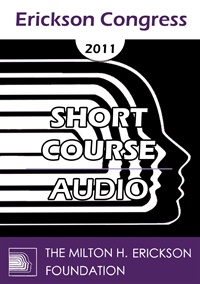
- Average Rating:
- Not yet rated
- Topic Areas:
- Short Courses | Brief Therapy | Subliminal Therapy | Unconscious Processes
- Categories:
- Erickson Congress | Erickson Congress 2011
- Faculty:
- Edwin Yager, PhD
- Duration:
- 1:31:56
- Format:
- Audio Only
- Original Program Date:
- Dec 09, 2011
- Short Description:
- Therapists will learn Subliminal Therapy (ST), a psychodynamic technique used to accomplish consciously desired change. ST is a hypnotically medicated and utilizes the capabilities of a higher level of the patient’s intelligence that exists in the unconscious domain. ST empowers the patient by providing awareness of causal influences, thereby facilitating resolution by the patient. ST is described, its effectiveness is quantified and justified, and typical applications are detailed. Additionally, participants will witness a demonstration of the technique.
- Price:
- $15.00 - Base Price
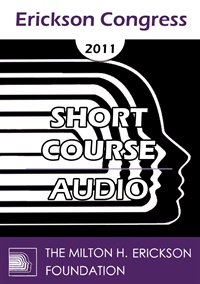
- Average Rating:
- Not yet rated
- Topic Areas:
- Short Courses | Art and Creativity | Brief Therapy | Consciousness | Unconscious Processes | Hypnosis | Resistance | Music
- Categories:
- Erickson Congress | Erickson Congress 2011
- Faculty:
- Alan Redstone, MA
- Duration:
- 1:25:54
- Format:
- Audio Only
- Original Program Date:
- Dec 09, 2011
- Short Description:
- Music is an effective Brief Therapy tool that can be used to instantly access right brain intelligence, elicit conscious and unconscious material for processing, and induce hypnotic states that render listeners receptive to positive suggestions of wellness, relaxation, and integration. A single short song can cut through resistance, setting the perfect atmosphere for a highly productive session.
- Price:
- $15.00 - Base Price
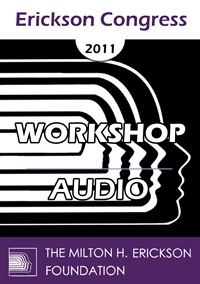
- Average Rating:
- Not yet rated
- Topic Areas:
- Hypnosis | Workshops | Self-Hypnosis | Unconscious Processes | Ideomotor
- Categories:
- Erickson Congress | Erickson Congress 2011
- Faculty:
- Sidney Rosen, MD
- Duration:
- 59 Minutes
- Format:
- Audio Only
- Original Program Date:
- Dec 09, 2011
- Short Description:
- We will explore and experience many ways of communicating with, and receiving feedback from, our “unconscious min” through “automatic” bodily movements and sensations. These responses can confirm, predict and validate the effectiveness of auto-suggestions given without the need of a “trance” experience.
- Price:
- $20.00 - Base Price
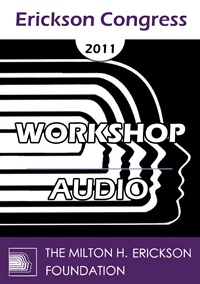
- Average Rating:
- Not yet rated
- Topic Areas:
- Workshops | Unconscious Processes | Communication | Metaphors | Interspersal
- Categories:
- Erickson Congress | Erickson Congress 2011
- Faculty:
- Richard Gellerman, PhD
- Duration:
- 59 Minutes
- Format:
- Audio Only
- Original Program Date:
- Dec 07, 2011
- Short Description:
- The use of Conversational Unconscious Communication give the therapist a greatly enhanced ability to influence the client to generate lasting positive change. This workshop will enable the participant to learn the structure and uses of therapeutic metaphor and the interspersal technique at both the conscious and unconscious levels of the mind.
- Price:
- $20.00 - Base Price


